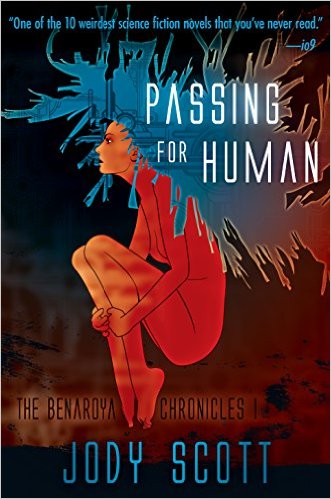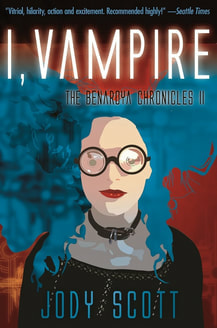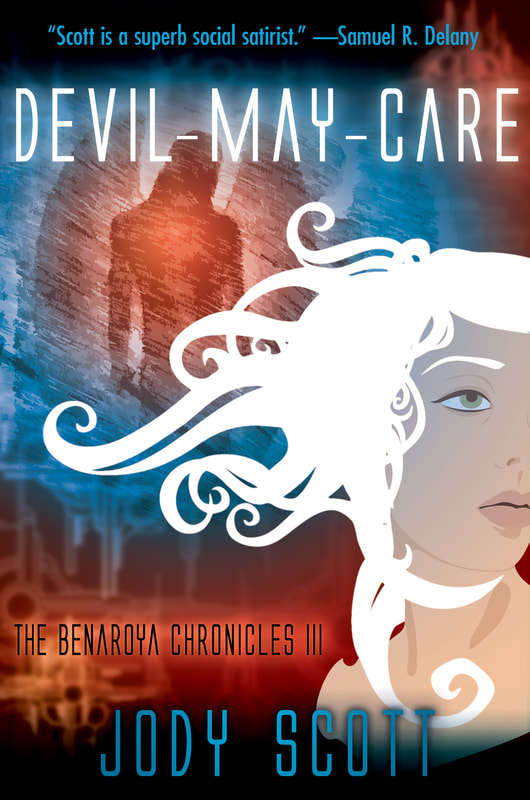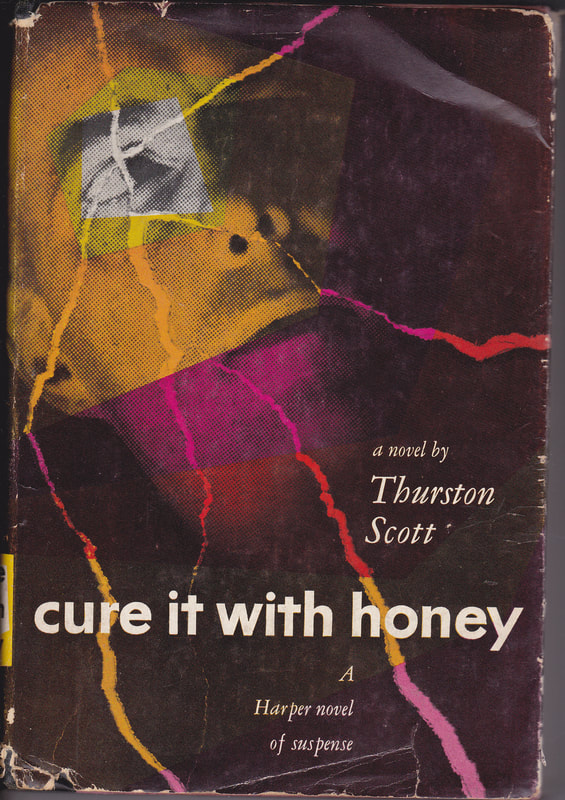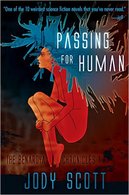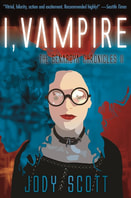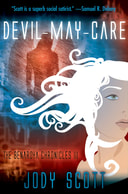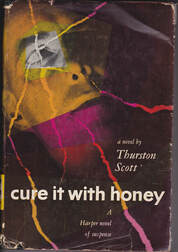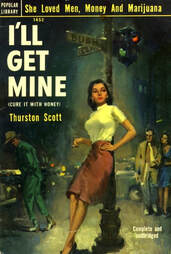The Benaroya Chronicles are an outrageously extraterrestrial look at the human condition.
When a team of alien anthropologists comes to Earth in replicated bodies, attempting to pass for human based on historical documents, old movies and pop culture, there ensues madcap action and a gleeful skewering of everything (we think) it means to be human.
When a team of alien anthropologists comes to Earth in replicated bodies, attempting to pass for human based on historical documents, old movies and pop culture, there ensues madcap action and a gleeful skewering of everything (we think) it means to be human.
|
Publisher's Weekly:
The second book of Scott's Benaroya Chronicles (after Passing for Human), first published in 1984, is still one of the most astonishing works of science fiction ever written. Sterling O'Blivion is hard at work fleecing ordinary citizens out of their life savings when she unexpectedly runs into Virginia Woolf in the ladies' room. But Woolf isn't Woolf—she's the titular vampire, Benaroya, a 36-foot-tall body-swapping alien trying to save humanity from the sinister Sajorians. Naturally, Sterling falls madly in love with her. Benaroya's plan involves selling Famous Men's Sperm Kits to adjust human perceptions and coaxing the world into psychic enlightenment over several centuries, unless the Sajorians (or Sterling's own morbid self-pity) get in the way. Scott's complex theories of reality will be a barrier to comprehension for many, but readers who can stick out the obtuse bits will be rewarded with a stunning piece of iconoclasm as Scott takes human society to task for its casual cruelties, meaningless obsessions, and ironic hatred of love. Most notably, Sterling's vampirism and lesbian identity work in tandem to make this an early and invaluable work of queer feminist SF; its historic nature alone is worth the price of admission. Introduction by Theodore Sturgeon. -Publisher's Weekly Starburst Magazine: Sterling O’Blivion has been a vampire for 900 years, and has spent her life observing the evolution of a human race - and now works at a dance studio. Thankfully, she is not an obsessive, sulky vampire like those found in some of the more famous fantasy novels! Scott crafts a dry, witty protagonist, whose voice and observations concerning society and humanity will keep you captivated and more often than not, make you laugh or keep you deep in thought. Then one day, after becoming content with her modern life, O’Blivion meets Virginia Woolf - also known as Benaroya, an enthusiastic, bubbly alien that soon becomes O’Blivion’s lover, while they work together to defeat a rival alien threat, and start a business selling Famous Men’s Sperm. The plot in this novel is unlike one we’ve ever encountered before - it’s wild and complex, but intriguing and one that definitely keeps the book on your mind, even days after you finish it. Scott also creates fantastic characters that carry the story, and even when the plot gets complicated, Benaroya’s enthusiastic quips or Sterling’s witty and cutting thoughts will carry you through the more technical side of the plot, which can lose you at times. Thankfully, if you do get a bit lost, it won’t impact your enjoyment of the book, as the sci-fi elements don’t ultimately carry that much importance to the story or it’s overall message. Scott crafts an intriguing, funny, and extremely clever story that entertains, while also offering enlightening observations on elements of society. While the outlandish plot and age of the book might put some readers off, we wouldn’t let it stop you. Reading it is an experience that you will want to have, if only to see a vampire and Virginia Woolf try to set up a business to sell sperm to housewives! That, and it’s an extremely well written, witty and thoughtful novel to boot. BY CHLOE SMITH, reviewed April 2016 TimeOut: Jody Scott knows that science fiction reaches the parts other fiction cannot reach. Like Philip K. Dick, she uses science fiction to question the meaning of reality and the nature of humanity- but saying that doesn't even hint at what a wild, original and outrageously funny writer she is. The narrator of 'I, Vampire' is Sterling O'Blivion, a 700-year-old vampire working in a Chicago dance studio when alien anthropologist Benaroya , wearing a Virginia Woolf body, enlists her aid in a plan to cure humanity of its mass psychosis. Symptoms of this psychosis include wars, inflation, unemployment, boring novels and insurance: "If a species has "insurance" it is patently doomed. Only a toylike, salivating, pent-up bunch of gruntlings could have conceived of such a sociopathic type of gambling." Fortunately for us, the willingness of just one person to stand up and say "Hey, wait a minute. Why are we acting like psychotics?" may be enough to set off a "self-propagating chain reaction of sanity." 'I, Vampire' is not only great good fun, it's better for you than Vitamin C, garlic or aerobic dancing. Read it: the reality you change may be your own. Goodreads: “Sterling O'Blivion happens to be a vampire and has lived 900 years but that just makes her the logical choice to oversee the psychic evolution of the human race (or face extermination by the Rysemians). She and [Beneroya] her Rysemian lover, in the body of Virginia Woolf, head up a company to sell a Famous Men's Sperm Kit, which is intended to spur this evolution… They also run into a rival alien race who just wants to capture humans to ship them off as food/slaves/curiosities. The writing is hilarious and witty. There are lots of funny images, like rows of cloned Nixon's being used as servants (although they are the old model and are being gradually updated to the new Reagan models)… The places it goes keeps being totally unexpected and intriguing… Pretty original stuff. If you are expecting either a vampire novel or a sci-fi novel, this isn't it. It has bits of both but lots more.” Andromeda Spaceways: After thirty years out of print, Jody Scott’s strange and vitriolic feminist science fiction series, The Benaroya Chronicles, is enjoying new life in a new print run from Digital Parchment Services. The first novel in the series, Passing for Human, has already been released. Now I, Vampire, the second novel in the series, is enjoying a reprint. This new edition comes with an introduction by Theodore Sturgeon. Sterling O’Blivion is a centuries-old vampire living in 1980’s Chicago where she manages a dance studio dedicated to ripping off vulnerable middle-aged capitalists. For fun, and because she could, she built herself a time machine. Sterling is less morally conflicted about her vampirism then about her job, but she takes a circumspect perspective of the whole endeavor, though she is taking a dim view of her current rut. It seems that life has lost its pizzazz – at least until her old crush, Virginia Woolf shows up. Except it’s not Virginia Woolf, it’s an alien dolphin wearing Woolf’s shape, and she needs Sterling’s help. It seems humanity has, though its own mass of failings, doomed itself to corruption. Woolf – Benaroya – has a complicated plan to save humanity from itself, and from the villainous Sajorians who plan to feed off humanity’s baser instincts. Sterling, drawn by Woolf’s charisma and strange, down-home yet other-worldly charm, finds herself questioning her ethics as she is pulled into Woolf’s bizarre scheme. Sterling is a character of contradictions – strong yet vulnerable, willful yet reticent, flirtatious yet gun-shy. Her voice is chaotic, sarcastic, and wonderfully acerbic. Scott uses her as a scattershot; there is nothing in modern society Sterling does not have an opinion on, often outrageous, always remarkably astute. Scott, through Sterling, demonstrates a slick capacity to effortlessly move from one social critique to another without drawing breath. Contrasted to Sterling is Benaroya: expansive, charismatic, outspoken, yet strangely artless. And also a space-dolphin. This really is one of the strangest books I’ve ever read. Several times I had to stop reading just to process what was going on. It’s clear Scott felt unrestricted by genre or convention, yet she handles unconventionality with a ridiculous, infectious glee. It’s outrageously fun, at least when you’re not tying your brain into knots keeping up with her. That said, it’s an acquired taste. If you’re the sort of person who enjoys the weird, sideways style of Vonnegut at his least lucid, Scott’s madcap style will probably work for you; if you like your fiction a little less post-modern, I, Vampire will taste sour. Even still, it is artfully done. If you are looking for a dose of the weird and intellectual, or if you are already a fan of Scott’s work, this new edition will enrich your e-reader. --Catherine Moller The Seattle Times: "What is one to make of this second science-fiction novel by Seattle author, Jody Scott? Especially one which asks on the cover, "Can a seven-hundred-year-old Transylvanian find true love with a revolutionary Rysemian fish-woman? A lot of of fun, for one thing. You don't like vampire stories? Sterling O'Blivion is not an ordinary vampire. Scott does a wonderful job of shattering vampire myths as O'Blivion explains how she has lived to the present time and has become a top instructor at the Max Arkoff dance studio. Having established the vampire solidly, Scott then introduces alien invasion. Virginia Woolf and Sterling O'Blivion have a wonderful brawl in the ladies' restroom, and then fall madly in love. But Woolf, whom O'Blivion met one time for an hour, is really Benaroya, an alien from Rysemus, whose natural form is that of a fat sea-pig. There's a method to all this madness. The Rysemians are on Earth to prevent the Sajorians, a second alien race, from conquering the world. They, too, are able to assume human form. Whom can one trust? Are Patty Cox and Johnny File, friends of O'Blivion, human or alien? There is much action in this novel, but its real appeal is in Scott's stabs at the foibles and shortcomings of our society. Woolf, as alien, and O'Blivion, as someone who has seen it all, are perfect spokesmen for such criticism. Jody Scott sees things with a clear eye. You must read carefully, for she can point a caustic finger with a single throwaway line. And when she really winds up, everything is fair game: big business, the military, politics, religion and more. In addition to sharpness and criticism, there are wackiness, clever dialogue, action and lots of love. Underneath it all, there is the sense that Scott loves humanity, with all of its weaknesses. Her sharp critical eye tells us to look around, to see the awful things we do to ourselves and each other. In spite of what she sees, Scott is saying, "I love you, world." This reviewer doesn't even like vampire stories. But I enjoyed this one immensely and recommend it highly." -- Frank Denton The Evening Post, Nottingham, U.K.: "In 1980's Chicago, a disillusioned vampire from 13th-century Transylvania meets Virginia Woolf in a washroom. They beat the stuffing out of each other, then fall in love before moving several years into the future and setting up an artificial insemination company using famous men. This is all part of a revolutionary plan by a race from another planet to make earth a jollier place by alerting its inhabitants to the fact that reality is self-created- and can therefore be altered at will. The plot of Jody Scott's I, Vampire is startlingly wide-ranging - leaping barriers of time, place and personalities as neatly as the author ignores the restraining rules of convention and logic. Superficially, this funny and thought-provoking book tells of the battle for humankind's soul between the evil Sajorians and the white-hatted Rysemians, but I, Vampire also has much to say about the shortcomings of life- and the therapeutic effects of a lot of positive thinking." -Caroline Stringer |
Publisher's Weekly:
This satire was first published in 1977, but its biting commentary still registers strongly today. Aliens trained in Western pop culture disguise themselves as well-known figures and embark on two intersecting tasks: judging humankind’s readiness to join the interstellar community, and searching for a ruthless criminal. Scott carries on the tradition of Mark Twain, using outside observers to remark on society. While the treatment of women is the primary focus, other targets include consumer culture and the general human willingness to be led by the nose by a charismatic figure. The narrative drags at times, but the speculative elements are well written and give a good sense of physical and cultural differences. A light touch keeps the moralizing from getting too ham-fisted, and this cautionary tale calling for a better world is a message needed now more than ever. (Mar.) iO9: One Of The 10 Weirdest Science Fiction Novels That You've Never Read Future Imperfect -- Neil Gaiman reviews the Sci-Finest : Anyone who appreciates the offbeat (and the off the wall) will enjoy Scott's Passing For Human. Benaroya is a visiting alien, whose mission (to save the human race from an evil alien invasion, and to have a good time while she's at it) is complicated by her inability to understand why human beings make a fuss over such inessentials as death, pain and the physical universe. Wearing an attractive assortment of bodies, including those of Emma Peel and Virginia Woolf, Benaroya shows herself and the reader a riproaringly magnificent time. Passing For Human is quite unlike anything anyone else has ever done. Fantasy & Science Fiction Magazine: A ploy older than Gulliver although Swift made the approach an adjective: protagonist comes to alien world whose natives and absurdities are of course not at all "alien" but refractive of the human condition. The tilt of alien perspective however enables the insanity, of that condition, perceived by a faux-naif to be the more clearly perceived. Scott's Benaroya, researching, takes on the body of an attractive Terran female---wildly attractive, I should say, much of the plot keys on responses to "her" breasts---and explores 1970's California. Aren't these humans quaint! They actually believe that accumulation of these silly goods differentiates them! They want to hurt one another! They are obsessed by procreation, so cunningly objectified in their vehicles of transport! Benaroya, expanding her mission, experiments with time travel and finds Lincoln, Woolf, Heidi, to be no less insane. Mixture of fictional and "real" characters? Humans, those pitiful creatures, get all hung up on the need to compartmentalize. This is the greatest employment of science fiction in the service of satire; we've had notable satirists---but Scott alone refuses to sentimentalize. The best unknown sf writer. The Encyclopedia of Science Fiction: A joyously and at times scatologically tangled Satire of the post-industrial Western world from a Feminist point of view that wittily verges on misandry. grumbooks Review: I missed this book when it first came out (and only came across it as I’m obsessively filling in the gaps in my Women’s Press science fiction collection). This was my loss. The basic story is fairly straightforward sf fare. Alien anthropologists study earth, despair at humans, decide they are a disease that needs wiping out, whilst doing battle with other aliens who wish to enslave humanity (and perhaps produce what would be the most frighteningly efficient and expendable race of warriors the galaxy has ever seen). In the hands of a lesser writer that could have been a big, steaming pile of schlock. In the hands of Jody Scott, it is a funny, compassionate, and rip-roaring adventure that exposes the flaws in the alien cultures just as readily as it exposes our own. The pace of the story never lets up, yet it finds room for serious contemplation of humanity’s woes. The style is easy, with an edge of noir. The central character is a bit of a tough girl which, mixed with her naivety about humans, makes for an intriguing and likeable character. Especially as she (in common with the other aliens) inhabits bodies she has chosen from Earth culture – Brenda Starr, Emma Peel, and Virginia Woolf. Who could not like that, especially the final scenes in which Virginia Woolf is involved in a running gun battle. The humour, pace, and wry observation make this a rare and wonderful beast – a serious science fiction novel that doesn’t take itself seriously. Performative Utterance: The novel leaps along with an energy and a disregard for convention that reminds me a little of genre outsiders like Barry Malzberg and possibly Josephine Saxton in that this reads like a romp through the Collective Unconscious. A closer comparison might be with the early novels of Ishmael Reed who shares with Scott a vitriolic contempt for seemingly all and everything, sniping and satirising hilariously along the way. Jody Scott’s wild imagination, seemingly scattershot but tightly controlled, makes Passing For Human an absurdly comic romp of unexpected juxtapositions and witty asides. Good examples of what SF can do when it steps out of its comfort zone, and of how women’s SF can challenge the genre assumptions by challenging its tropes and its language. Take a look, see what you think. Birmingham SF News: Around a cliched plot- aliens visiting Earth incognito for different reasons Jody Scott has written a highly entertaining novel. Of the two groups one is an anthropological mission to decide on the collective sanity of Homo Sapiens; failure to obtain a positive judgement will result in the disintegration of all members of the species. The other is a freelance criminal bidding for world domination and collecting a few (thousand) specimens/slaves for torture and other fun games to pass the time. The two sides clash of course, but the whole affair has more to do with slapstick and custard pies in the face rather than Rambo or Smiley. It also has enough death and destruction to supply Death Wish IV and Rambo III whilst not losing its fast, slightly giggly, 'golly gee what fun' tone. It also includes a transvestite Abraham Lincoln clone, a female protagonist whose speech patterns are largely modeled on the 'ripping yarn'/Bunty tradition, and an underlying seriousness that only twice breaks the surface. It's rather as if Stranger in a Strange Land were rewritten as a cross between Hitchhikers Guide and The Rocky Horror Picture Show. Highly recommended. BESTSELLERS: Richard Nixon is the name of Brenda Star's robot-slave. Or slaves, as she owns several hundred. but Brenda Star is not really Brenda Star. She is one of several spare bodies put to use by Benaroya, a 36-foot, dolphin-like extraterrestrial who is furthering her anthropological studies on earth as she hunts down the evil cosmic being who is worshiped on 11 primitive planets as the Prince of Darkness. Scott's daring and sense of pure fun makes her first novel a memorable one, a splendid blend of satire and sf adventure. STARFORCE MAGAZINE: Passing For Human by Jody Scott is a fast-moving, genuinely funny novel. Benaroya from planet Rysemus comes to Earth to stidy humans after passing her academy classes in anthropology. She can change bodies at will. some bodies she and her alien colleagues use are Brenda Starr, Emma Peel (of TV's The Avengers), Abraham Lincoln and General George Patton. By this device the author can satirize role-playing in any number of social situations. The bodies are perfect copies, accurate "down to the very freckles and toenails, EKG, blood-sugar level and condition of arteries." Rival aliens from the planet Sajor, "spawning ground of master criminals" including the evil Scaulzo, arrive in UFO's to take over earth. Benaroya is charmed by the "earthies" targeted for destruction by the Sajorians. She sees an 80-foot-tall monument to a taco, in plastic, which turns out to be a restaurant where people line up to purchase "small, hot duplicates of the tasty food product."She encounters certain barbaric males she finds in power here: "Flattering movies about them are turned out by the hundreds. They run government, business, religion, sport and crime, which are actually all the same thing," This is the best satirical SF novel in a long time. Publishers Weekly: Devil-May-Care is “ambitious and overwhelming." Ernest Hogan, award-winning author of High Aztech and Cortez on Jupiter There’s a hilarious rage at the heart of [Devil May Care] that threatens to devour the plot, but doesn’t. Somehow Jody Scott has created a universe that tears across all the usual genre categories and makes brilliant, vicious fun of just about everything. It’s delicious craziness with some serious wisdom shining through. SF Mistressworks: “The rapid non-sequiturs Scott puts into Benaroya’s mouth and her aside justifications combine sharp jabbing observations and great humour. Those who seek to deride feminist SF often suggest that it is too serious, po-faced, but Jody Scott’s wild imagination, seemingly scattershot but tightly controlled, makes … an absurdly comic romp of unexpected juxtapositions and witty aside.” From Theodore Sturgeon: "Let it be understood that this is, however, not a vampire novel in any usual or expected sense.... If this astonishing book is about anything, it is about this kind of parallel; about Jody Scott's amazing ability to look askance and detached at humanity and human affairs, all the while passionately involved. And if that be a paradox, make the best of it.... after the huge enjoyment of Scott's vitriol, her hilarity, her delineations of action and excitement (and indeed, one can read for these facets alone and gain many times the price of admission)." "A further, truly remarkable achievement of hers is her ability to describe a steamy, passionate love sequence without being explicit. My. How unfashionable. How very refreshing!" For Books' Sake: "An exuberantly clever and wildly iconoclastic feminist and SF take on vampires in fiction. If you thirst for something really witty, quirky, with bags of brains [...] you'll do no better than this wonderful novel." |
Rogaway was a psychologist At San Quentin prison. Manny Chavez,
a Pachuco kid wanted news of his paroled brother Juan, wanted it enough
he was willing to go to a "brain screw" to get it.
a Pachuco kid wanted news of his paroled brother Juan, wanted it enough
he was willing to go to a "brain screw" to get it.
New York Times:
Highly satisfactory. It's sharply and vigorously told. It has all the currently requisite sex and
violence, but legitimately integrated into the story and theme. But it's more than just a
better-than-average toughie. Scott has lived and worked with the pachucos in Oakland; he understands them probably as well as an outsider can be permitted to; and he knows how
to make them come alive to the reader.
Oakland Tribune:
Tingling, rushing, violent yet thoughtful novel of danger, defiance, suspense, sudden death and sudden love. CURE IT WITH HONEY reveals more about the pachucos than is accessible
to social workers, police, probation and parole officers, prison guards or even the psychiatric clinic at San Quentin
San Francisco Chronicle:
The style is exactly suited to the raw actuality of the subject; suspense and pace are excellent, and altogether this is a thriller to impress you. The authors are to be congratulated on finding a new and living theme.
Kirkus Reviews:
A story of suspense which lends a grim seriousness- along with some uncommonly taut excitement to the story of California's Pachucos and their hard hatred of a white world. For Rogaway, a brain screw at San Quentin, in his attempt to locate a parolee, finds that the boy has been killed, falls in love with his sister, and fights his way through knives and needles to save her in a melodrama which throws off a glazed violence and bitterness.
San Francisco Call Bulletin:
A superb short novel.
Monterey Herald:
Here is no ordinary who-dunit, with fabricated background and two-dimensional characters. CURE IT WITH HONEY, starkly, brutally realistic, does something far more than offer escape through a story which mounts swiftly and movingly to an inevitable climax.
Highly satisfactory. It's sharply and vigorously told. It has all the currently requisite sex and
violence, but legitimately integrated into the story and theme. But it's more than just a
better-than-average toughie. Scott has lived and worked with the pachucos in Oakland; he understands them probably as well as an outsider can be permitted to; and he knows how
to make them come alive to the reader.
Oakland Tribune:
Tingling, rushing, violent yet thoughtful novel of danger, defiance, suspense, sudden death and sudden love. CURE IT WITH HONEY reveals more about the pachucos than is accessible
to social workers, police, probation and parole officers, prison guards or even the psychiatric clinic at San Quentin
San Francisco Chronicle:
The style is exactly suited to the raw actuality of the subject; suspense and pace are excellent, and altogether this is a thriller to impress you. The authors are to be congratulated on finding a new and living theme.
Kirkus Reviews:
A story of suspense which lends a grim seriousness- along with some uncommonly taut excitement to the story of California's Pachucos and their hard hatred of a white world. For Rogaway, a brain screw at San Quentin, in his attempt to locate a parolee, finds that the boy has been killed, falls in love with his sister, and fights his way through knives and needles to save her in a melodrama which throws off a glazed violence and bitterness.
San Francisco Call Bulletin:
A superb short novel.
Monterey Herald:
Here is no ordinary who-dunit, with fabricated background and two-dimensional characters. CURE IT WITH HONEY, starkly, brutally realistic, does something far more than offer escape through a story which mounts swiftly and movingly to an inevitable climax.
cure it with honey is not currently in print, nor is it available anywhere at
any price. The only way to get to read it is by subscribing to Jody Scott Info.
any price. The only way to get to read it is by subscribing to Jody Scott Info.
